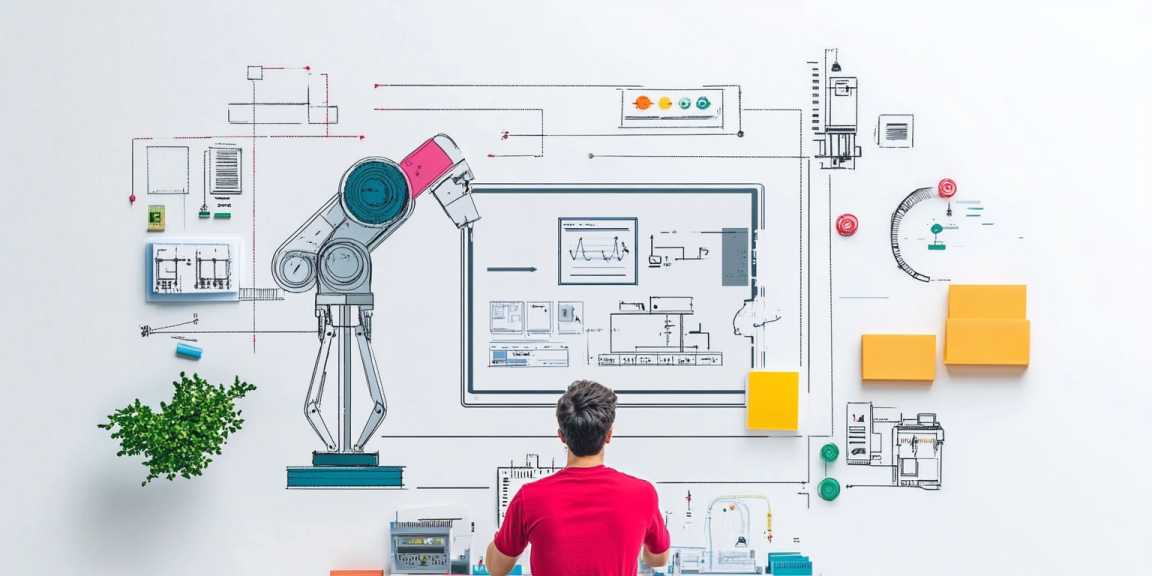The world has been witnessing a significant shift in how we handle money. Digital currencies,…

Artificial Intelligence (AI) has evolved from a niche concept in the realm of science fiction to a transformative force in nearly every aspect of modern life. From healthcare to education, transportation, and personal assistants, AI is increasingly becoming an integral part of our daily experiences. The possibilities of AI in improving the quality of life are vast, and while many experts believe that AI will greatly enhance our lives, there are also concerns about its potential risks and unintended consequences. In this blog post, I’ll explore the role of AI in enhancing our quality of life, discuss the opportunities it presents, and examine the challenges we must overcome to ensure that we are truly ready for the AI-driven future.
AI in Healthcare: Revolutionizing Patient Care
One of the most significant contributions that AI is making to society is in the field of healthcare. AI-powered technologies are enabling faster and more accurate diagnoses, improving treatment options, and even predicting potential health issues before they become critical. Medical professionals are increasingly relying on AI tools to analyze complex medical data, such as imaging scans, genetic information, and patient records, to provide more personalized and effective care.
For instance, AI systems like IBM Watson are capable of analyzing vast amounts of medical literature and clinical trial data to assist doctors in making informed decisions. These tools are capable of detecting patterns that may not be immediately visible to human clinicians, enabling early intervention and reducing the chances of misdiagnoses. Additionally, AI is facilitating the development of precision medicine—treatment plans that are tailored to individual patients based on their genetic makeup, lifestyle, and other factors.
Moreover, AI has the potential to revolutionize elderly care, providing smart home systems that can monitor a person’s health, detect falls, remind them to take medication, and even call emergency services when needed. As our population ages, the demand for such systems will only grow, and AI has the potential to improve quality of life for older individuals by allowing them to live independently for longer.
AI in Education: Personalized Learning for All
Education is another area where AI is playing a transformative role. Traditional education systems often struggle to cater to the diverse needs of students, with some requiring additional support and others needing advanced challenges. AI, however, is enabling personalized learning, allowing each student to progress at their own pace and according to their unique learning style.
AI-powered tools can adapt in real-time to the needs of the learner, offering customized content and exercises that target specific areas of difficulty. Platforms like Coursera, Duolingo, and Khan Academy use AI to personalize learning experiences and help students achieve their full potential. For example, AI-driven language learning apps can adjust their difficulty level based on the learner’s progress and even provide real-time feedback on pronunciation and grammar.
Beyond the classroom, AI is making education more accessible to individuals around the world. Thanks to machine learning algorithms, online learning platforms can offer courses to anyone with an internet connection, breaking down geographical and financial barriers. This democratization of education is giving more people the opportunity to acquire new skills and improve their quality of life, regardless of their background or location.
AI in Transportation: Making Travel Safer and More Efficient
Transportation is another area where AI has the potential to significantly enhance quality of life. AI-powered technologies are making travel safer, more efficient, and environmentally friendly. One of the most notable innovations is the rise of autonomous vehicles (AVs), which use AI to navigate roads without human intervention.
Self-driving cars have the potential to reduce traffic accidents caused by human error, decrease traffic congestion, and provide mobility options for people who are unable to drive due to age, disability, or other factors. Additionally, AI is improving public transportation systems, optimizing routes and schedules to make commuting faster and more efficient. AI-driven traffic management systems can analyze real-time data to adjust signal timings, reducing congestion and emissions.
Moreover, AI is playing a critical role in the development of electric and sustainable transportation. By optimizing routes for energy efficiency and integrating with renewable energy sources, AI can help reduce the carbon footprint of transportation, contributing to cleaner air and a healthier environment.
AI in Home Automation: Enhancing Daily Living
AI’s impact on quality of life extends to the home environment, where smart technologies are transforming how we live. Smart home devices powered by AI, such as voice assistants (like Amazon Alexa and Google Assistant), smart thermostats, and security systems, are making everyday tasks easier and more efficient.
For example, AI-powered voice assistants allow us to control lights, appliances, music, and even manage our calendars with simple voice commands. Smart thermostats can learn our daily routines and adjust home temperatures accordingly, providing comfort while reducing energy costs. Additionally, AI-driven security systems use facial recognition and motion detection to keep homes safe from intruders, and they can send alerts to homeowners if suspicious activity is detected.
As smart homes continue to evolve, AI will be able to anticipate our needs and help manage household tasks without much input from us. Whether it’s automatically adjusting the lighting based on the time of day, ordering groceries when supplies run low, or reminding us to take out the trash, AI has the potential to make our daily lives more convenient and comfortable.
AI and the Future of Work: Increasing Efficiency and Creativity
The workplace is another area where AI is making a significant impact. AI is transforming how we work by automating repetitive tasks, increasing productivity, and enabling employees to focus on more strategic and creative aspects of their jobs. In industries like manufacturing, finance, and customer service, AI-powered systems are handling everything from data analysis to customer interactions, freeing up human workers to concentrate on higher-level functions.
In creative fields, AI is helping to enhance human creativity rather than replace it. For example, AI algorithms are assisting in the creation of music, art, and even writing. These systems can analyze existing works to generate new ideas and provide suggestions, acting as a creative partner rather than a replacement. AI is also facilitating more collaborative work environments by providing insights from data and improving decision-making processes.
However, there are concerns about the future of work in an AI-driven economy. While AI will undoubtedly lead to increased efficiency, there are fears that it could result in job displacement for certain roles, especially in sectors like manufacturing and transportation. To ensure a positive impact on quality of life, it’s essential to focus on reskilling and upskilling the workforce to adapt to these changes.
The Ethical Implications: Are We Ready for AI?
While the benefits of AI are undeniable, there are important ethical questions that need to be addressed to ensure that AI is developed and deployed responsibly. One of the key concerns is the potential for AI to exacerbate social inequalities. For example, AI-driven automation could disproportionately affect low-wage workers, leading to greater economic disparity. Additionally, there are concerns about the impact of AI on privacy and data security, as AI systems collect vast amounts of personal information.
Another issue is the potential for AI to perpetuate bias and discrimination. Since AI systems learn from historical data, they can inadvertently reinforce existing societal biases. For example, AI systems used in hiring or law enforcement have been shown to reflect biases related to gender, race, and socioeconomic status. Ensuring that AI is fair, transparent, and free from bias is critical to its successful integration into society.
Moreover, as AI systems become more autonomous and capable of making decisions on their own, questions of accountability arise. Who is responsible if an AI system causes harm or makes an unethical decision? Establishing clear regulations and ethical guidelines is essential to addressing these concerns.
Are We Ready for the AI Revolution?
Despite the incredible potential of AI to enhance the quality of life, we are not yet fully prepared for the changes it will bring. There are several key areas where more work is needed to ensure that AI is used in ways that benefit society as a whole.
- Regulation and Governance: Governments and international bodies must work together to create clear and consistent regulations that address the ethical, legal, and social implications of AI. This includes ensuring that AI is used responsibly, protecting privacy and data security, and minimizing the risks of bias and discrimination.
- Education and Skill Development: As AI continues to evolve, it’s important to invest in education and training to help people adapt to an AI-driven world. This includes reskilling workers whose jobs may be displaced by automation and providing access to new educational opportunities in AI-related fields.
- Ethical AI Development: AI developers must prioritize ethics in their work, ensuring that AI systems are transparent, fair, and accountable. This includes addressing biases in training data, implementing safeguards against harmful use cases, and creating systems that can be audited and explained.
Conclusion: Embracing the AI Future Responsibly
Artificial intelligence has the potential to dramatically enhance our quality of life, from improving healthcare and education to making transportation safer and homes smarter. However, the path to a future where AI benefits everyone requires careful consideration of ethical, social, and economic factors. As we continue to develop and deploy AI, it’s essential that we approach it with responsibility, transparency, and a focus on equity.
While AI will undoubtedly lead to exciting innovations and improvements, we must be ready to address the challenges it presents. By embracing AI responsibly and thoughtfully, we can unlock its full potential to create a more efficient, equitable, and connected world.



